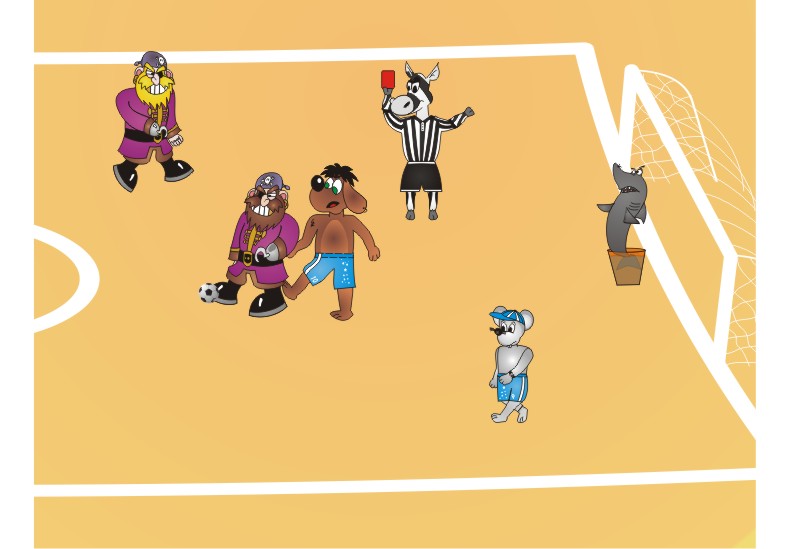Math Game Elements
Contents
Improving student affect through adding game elements to mathematics LearnLabs
Summary Table
Study 1
| PIs | Vincent Aleven, Ryan Baker |
| Other Contributers | Adriana de Carvalho (Research Associate, CMU HCII); Owen Durni, and Matt Morrill (Undergraduate research assistant, and former PSLC summer intern); Daniel Batalha (Artist, independent contractor) |
| Study Start Date | Fall, 2009 |
| Study End Date | |
| LearnLab Site | |
| LearnLab Course | Middle-School Mathematics |
| Number of Students | |
| Total Participant Hours | |
| DataShop |
Abstract
There is much evidence to believe that games are fun. Can we incorporate some of the features that make games fun into intelligent tutors, in a way that improves motivation, generates positive affect, and improves the robustness of student learning? Specifically, what happens if we take game elements known to be effective such as fantasy, competition, and trivial choice, and embed into tutors already known to promote learning, using principles in PSLC theoretical framework? In the current project (which started in Year 5 of the PSLC), we are investigating the effect of adding game elements to an existing set of fractions tutors developed by Martina Rau (Rau, Aleven, & Rummel, in press) for a different PSLC project. The game elements comprise a fantasy soccer game, where success in the soccer game depends on learning progress in the factions tutors.
Background & Significance
Games and tutors appear to have complementary strengths. The current project is an attempt to determine if we can develop learning environments that leverage the strength of each type of learning environment, creating learning software that is as motivationally effective as games but promotes robust learning as well as intelligent tutors. We investigate one particular way of integrating game elements and learning content, building a game around an intelligent tutor engine.
How best to integrate learning content and game elements has been the subject of much theorizing, with some authors arguing that optimal learning requires that the learning content and game world be mutually dependent (Lepper & Malone, 1987), and others arguing that the learning should be embedded in the game’s core mechanic (Habgood, 2007). However, such theories ignore the real-world success (at least in anecdotal reports from teachers and students) of environments that feature a much looser integration between learning and motivational embellishments (e.g., FirstInMath). Given that a loose coupling between game elements and learning activities is far easier to implement (since it avoids the difficult problem of embedding math problems in a storyline or game context, hard to do especially if the learning content is to be adapted to individual students’ learning results), it is reasonable to investigate this option first. It may well be that as long as the game features are “cool,” the degree of integration is not really a strong factor. As mentioned, the success of for example the motivational embellishments in FirstInMath certainly suggest so.
Glossary
Hypotheses
- H1
- A tutor with game features will lead to equal robust-learning outcomes as an unmodified tutor covering the same material
- H2
- A tutor with game features will lead to significantly better affect (e.g. less boredom and frustration; more delight) than an unmodified tutor covering the same material
- H3
- Students will report higher liking of a tutor with gaming features than an unmodified tutor covering the same material
Independent Variables
We are investigating the effect of loosely coupling the fractions tutors to a parallel fantasy world. This fantasy world was designed in a participatory design process involving 6th graders (the target population). The main theme (soccer) was chosen because it will appeal to the taste of both girls and boys.
In the fantasy world, a soccer game takes place on a tropical beach between a motley crew of friendly animal characters and a group of invading pirates. This unfriendly bunch is intent on taking over the beach, a disaster that can be averted only by beating the pirates at the soccer game. The student regularly switches between the tutors and the fantasy world (in a manner controlled largely by the system). During each visit to the fantasy world, the student selects a game move (e.g., a deep pass, or less risky dribble). The outcome of that move will not be known until the student’s next visit to the fantasy world, and the probability of success of that move depends on the student’s performance on the intervening fractions problems. (It may be clear that this coupling between game elements and learning is loose: different learning content could be slotted in without changing the game.)

An image from the "pirate soccer" fantasy world
Dependent Variables
We will evaluate whether this game leads to increased learning, compared to a standard tutor without the game elements, and whether any improvement in learning we may observe is mediated by increased motivation and more positive affect. Affect will be assessed by means of field observations, motivation (interest, self-efficacy) by means of questionnaires. We will evaluate both whether the game leads to greater persistence (when student have the option to do something else), and whether it leads to greater learning even when the set of learning activities (but not time) is held constant (which if true would mean that the game elements lead to deeper processing during the same set of learning activities).
Planned Experiments
We will conduct an in-vivo experiment comparing the tutor with game features against the regular tutor.